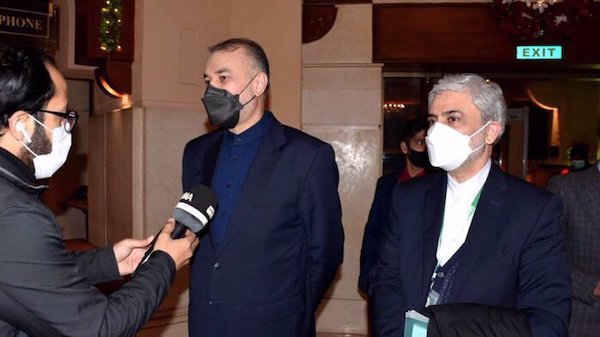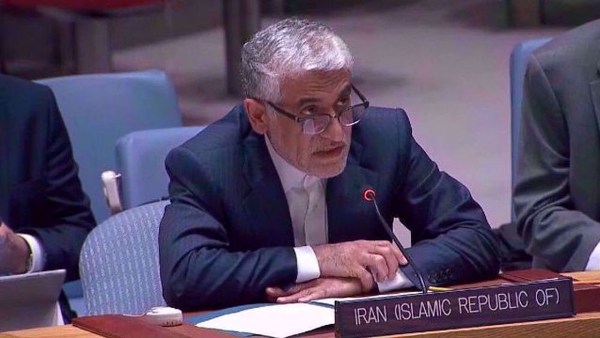
Iranís Foreign Minister Hossein Amir-Abdollahian speaks to IRNA reporter in Islamabad, Pakistan, December 19, 2021.
Iranís Foreign Minister Hossein Amir-Abdollahian has underlined the need for the formation of an inclusive government in neighboring Afghanistan with the participation of all ethnic groups, amid concerns about the rapidly unfolding humanitarian crisis in the South Asian country.
He made the remarks in an interview with IRNA news agency early on Sunday, upon arrival in the Pakistani capital, Islamabad, to participate in the 17th extraordinary session of the Organization of Islamic Cooperation (OIC) Council of Foreign Ministers on Afghanistan.
The top diplomat raised concerns about the rise of terrorism in Afghanistan and the outflow of refugees toward the Iranian border in recent months, saying, "We believe that the solution to the Afghan issue lies in the formation of an inclusive government with the participation of all ethnicities."
He also expressed hope that the participants at the OIC meeting would be able to send a unanimous message to the international community and the interim governing body in Afghanistan regarding the formation of such a government in Kabul.
The top Iranian diplomat pointed to close and fraternal relations with Pakistan, saying that the Islamic Republic pays "special" attention to neighbors, and that Pakistan is one of Iranís good neighbors.
"The 13th government has a clear plan and roadmap for further development of ties with the friendly and brotherly country of Pakistan," he added.
Amir-Abdollahian also noted that he would discuss the details of the plan for enhanced Tehran-Islamabad relations in meetings with high-ranking Pakistani officials, including Foreign Minister Shah Mahmood Qureshi.
The Iranian foreign minister was welcomed in Islamabad by Pakistani Minister of State for Parliamentary Affairs Ali Muhammad Khan.
In a post on his Twitter account, the Pakistani official said he "had a discussion with Foreign Minister of Iran Dr. Hossein Amir Abdollahian about bilateral relations between two brotherly Islamic states & role of @OIC_OCI in helping Afghanistan in coping with the up & coming challenges of health, food & education etc."
Envoys from 57 Islamic nations are attending at the OIC summit aimed at relieving the humanitarian crisis in Afghanistan, while testing diplomatic ties with its new Taliban rulers.
The meeting is the biggest major conference on Afghanistan since August, when the government and military collapsed in the face of the Talibanís swift advances on the ground, which many attribute to a hasty withdrawal of US-led occupation forces from the country.
After the Talibanís lightning return to power, billions of dollars in aid and assets were frozen by the international community, and the nation of 38 million now faces a bitter winter.
The Pakistani foreign minister said the meeting would speak "for the people of Afghanistan" rather than "a particular group."
He also said "recognition and engagement" should be differentiated in dealing with the new order in Kabul.
"Let us nudge them through persuasion, through incentives, to move in the right direction," Qureshi told reporters ahead of the OIC meeting.
"A policy of coercion and intimidation did not work. If it had worked, we wouldnít have been in this situation," he added.
The two-day meeting in Islamabad also includes representatives from the United Nations and international financial institutions, as well as from the United States, the European Union and Japan.
The Talibanís acting Foreign Minister Amir Khan Muttaqi is also attending, even though so far no country has officially recognized the new administration in Kabul.
Taliban officials have asked for help rebuilding Afghanistanís shattered economy and feeding more than 20 million people threatened with hunger.
Much will depend on whether Washington is willing to lift sanctions against Taliban leaders that have caused many institutions and governments to shy away from direct dealings with their government.
LINK: https://www.ansarpress.com/english/24874
TAGS:






























 Iran rejects Reuters report on deal in Vienna talks as effort to boost Western sideís standing
Iran rejects Reuters report on deal in Vienna talks as effort to boost Western sideís standing 




